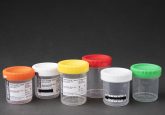New combination of biomarkers identified for the detection of Alzheimer’s disease
Researchers report on comprehensive global plasma metabolite profiling in the early diagnosis of Alzheimer’s disease.
A collaborative research group has developed new biomarker panels that are indicative of amnestic mild cognitive impairment (aMCI) and Alzheimer’s disease (AD).
The study initially sampled plasma from 57 people with AD, 58 with aMCI and 57 healthy volunteers of mean ages 74, 72 and 72 years, respectively. In order to determine potential biomarkers among the samples, the group applied a comprehensive platform using ultra performance LC–TOF–MS and GC–TOF–MS. The team then established a biomarker panel consisting of six plasma metabolites (arachidonic acid, N,N-dimethylglycine, thymine, glutamine, glutamic acid and cytidine), which discriminated AD patients from normal control, in addition to another panel of five plasma metabolites (thymine, arachidonic acid, 2-aminoadipic acid, N,N-dimethylglycine and 5,8-tetradecadienoic acid), which was able to differentiate aMCI patients from control subjects.
The study, which was co-led by Wei Jia, from Shanghai Jiao Tong University Affiliated Sixth People’s Hospital (Shanghai, China), and Sheng-Di Chen, from Rui Jin Hospital (Shanghai, China), concluded that the biomarker panels were in good agreement with clinical diagnosis. In addition, the team discovered that no altered metabolites were found among the patients at different stages, as well as among those on anticholinesterase medication and those without anticholinesterase medication.
According to the team, the study is unique in that it sampled a larger patient population relative to earlier studies, and analyzed a large number of metabolites in order to identify biomarker panels. The results of the study may be significant in the early diagnosis of AD, in addition to understanding the pathogenic mechanism of AD and aMCI.
Source: Wang G, Zhou Y, Huang FJ et al. Plasma metabolite profiles of Alzheimer’s disease and mild cognitive impairment. J. Proteome Res.13(5), 2649–2658 (2014).






